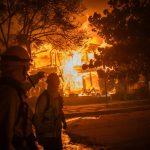Amid the state’s highest ever daily case number the Sunday Herald Sun can reveal high level briefings have again discussed the option of converting the Melbourne Convention and Exhibition Centre into a hospital.Multiple sources familiar with the arrangements have confirmed the idea has been canvassed for the first time since it was raised as an option at the beginning of the pandemic.The contingency plan was considered as early as March 2020 but was shelved after Victoria drove cases to zero.But with case numbers continuing to rise, and a higher proportion of patients needing intensive care than last year, some senior officials have questioned the capacity of the hospital system.“The plan is on reserve. Case numbers are not going in the right direction, and very serious consideration is being given to the contingencies in place,” one senior government source said.“The site is perfect for a temporary hospital, but we’re really hoping it’s not needed.”The source said a significant complication to using the site would be losing one of the state’s two largest vaccine hubs currently operating from the centre.The Department of Health has flagged it will need additional beds in coming weeks, and on current projections say the hospitals currently treating Covid patients may not be sufficient.Health Minister Martin Foley has also flagged suspending some elective surgery as needed.According to one senior government figure a ‘field hospital’ scenario isn’t yet projected to be required.However such a proposal would become a live option if there was a surge in demand for intensive care beds.Cities including London and New York have each introduced field hospitals at various times throughout the pandemic.Modelling by the Burnet Institute, commissioned by the state government, has forecast up to 120,000 diagnosed cases after the easing of restrictions.Health sources said such a scenario would put unprecedented pressure on the state’s hospital system.One senior source said authorities were actively preparing for a “NSW level impact to hospitals” with consideration given to pulling nurses off the vaccine front line if needed.Such a move risked slowing the state’s vaccination rollout with the potential to further delay meeting recovery road map targets.A surge workforce of 2,200 oral and allied health professionals and students is currently being trained to replace nurses on the jab frontline.But just 300 newly trained vaccinators have completed the training since the initiative was announced three weeks ago.Others have been employed directly by vaccination sites via health services and community health partners.In April last year the government promised a $1.3 billion injection to quickly establish an extra 4,000 ICU beds in response to the pandemic.By August 1,556 critical care spaces had been prepared across public and private hospitals with another 2,700 to be made available if required.Mr Foley said he was confident the system could keep pace but would not say how long it would take to scale up to 4,000 ICU beds if such a scenario were necessary.Yesterday he said that once case numbers surge further there would be changes to the way hospitals are managed. “We know that we can do that, but it will be at the expense of other arrangements in the health system and it will be at the expense of our already fatigued health professionals who will be working even harder,” Mr Foley said.The first stage is to ensure specialist centres are prepared to manage vulnerable groups such as pregnant women and the elderly. The next step would be to pause non-urgent elective surgery, with hospitals to determine which areas went on hold to put “as many resources as are needed into the healthcare of Covid patients” and for the private system to take up some urgent surgery.“We know that we can do that, but it will be at the expense of other arrangements in the health system and it will be at the expense of our already fatigued health professionals who will be working even harder,” he said. “It’s looking challenging every day, our public health system was already dealing with peak loads before this particular outbreak as a result of deferred care, as a result of increased levels of demand more broadly.” Opposition leader Matthew Guy called for greater transparency around the hospital system’s capacity to cope.“I’m really concerned about the loss of elective surgery, I’m very concerned about hearing about in the Eastern suburbs, some category one surgeries are already being delayed,” he said.“I think the government really needs to give us more than just a trust me, that they’ve got it in hand.“We need to know where are the hospital beds that were promised by the government in April last year, every Victorian deserves to know.“This is about our health. It’s about knowing the health system is prepared.”
Powered by WPeMatico





